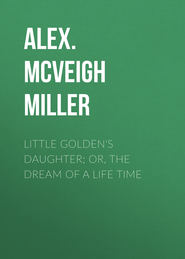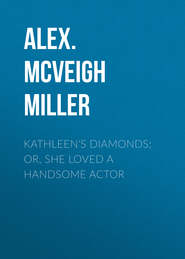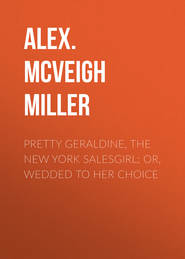По всем вопросам обращайтесь на: info@litportal.ru
(©) 2003-2024.
✖
Lancaster's Choice
Автор
Год написания книги
2018
Настройки чтения
Размер шрифта
Высота строк
Поля
Gazing intently out to sea, he started when a hand soft and white as a snow-flake fluttered down upon his coat-sleeve. He glanced quickly around.
"Miss West!" he exclaimed, in surprise.
She glanced up deprecatingly into his face.
"I—I was rude to you just now," she stammered. "I beg your pardon for it. I—I really don't know why I was so. I don't dislike you, indeed, and I think you are very nice. I have enjoyed the chair and the books, and I have been sorry ever since that day when I came down to the steamer and did not wait for you. But—somehow—it was very hard to tell you so."
She had spoken every word with a delightful shyness, and after a pause, she went on, with a catch in her breath:
"As for your being poor, I never thought of that—never. I think poor men are the nicest—always. They are handsomer than the rich ones. I—"
She caught her breath with a gasp. He had turned around quickly and caught her hand.
"Miss West—" he was beginning to say, when a sudden step sounded beside them.
Lieutenant De Vere had come up to them. There was a sudden glitter in his brown eyes—a jealous gleam.
"I beg your pardon. Are you and Miss West rehearsing for private theatricals?" he asked, with a slight sarcastic inflection.
Lancaster looked intensely annoyed; Leonora only laughed.
"Yes," she said. "Do you not think that I should make a good actress, Lieutenant De Vere?"
"Yes," he replied, "and Lancaster would make a good actor. 'One man in his time plays many parts.'"
Lancaster looked at him with a lightning gleam in his blue eyes. There was a superb scorn in them.
"Thank you," he replied. "And to carry out your idea, I will now make my exit."
He bowed royally and walked away. De Vere laughed uneasily; Leonora had coolly gone back to her book. His eyes flashed.
"If anyone had told me this, I should not have believed it," he muttered. "Ah! it was well to lecture me and get the game into his own hands. Beggar! what could he give her, even if she bestowed her matchless self upon him—what but a barren honor, an empty title? Ah, well! false friend, I know all now," he hissed angrily to himself.
CHAPTER XV
Leonora, apparently absorbed in her book, watched her exasperated admirer curiously under her long, shady lashes. She divined intuitively that he was bitterly jealous of his handsome friend.
"Have I stirred up strife between them?" she asked herself, uneasily. "That will never do. I must carry the olive branch to the distrustful friend."
She glanced around, and seeing that Lancaster was not in sight, called gently:
"Lieutenant De Vere!"
He hurried toward her, and stood in grim silence awaiting her pleasure.
"I—want to speak to you," she said.
There was a vacant chair near at hand. He brought it and sat down by her side.
"I am at your service, Miss West," he said, stiffly.
He thought he had never seen anything half so enchanting as the face she raised to his. The big black hat was a most becoming foil to her fresh young beauty. There was a smile on the rosy lips—half arch, half wistful. The full light of the sunny day shone on her, but her beauty was so flawless that the severe test only enhanced its perfection. His heart gave a fierce throb, half pain, half pleasure.
"You are vexed with me?" said Leonora, in a soft, inquiring voice.
"Oh, no, no," he replied, quickly.
"No?" she said. "But, then, you certainly are vexed with some one. If it is not with me, then it must be with Captain Lancaster."
To this proposition, that was made with an air of conviction, he remained gravely silent.
"Silence gives consent," said the girl, after waiting vainly for him to speak, and then he bowed coldly.
"Then it is he," she said. "Ah, dear me! what has Captain Lancaster done?"
"That is between him and me," said the soldier, with a sulky air.
The red lips dimpled. Leonora rather enjoyed the situation.
"You will not tell me?" she said.
"I beg your pardon—no," he answered, resolutely.
"Then I will tell you," she said: "you think he has treated you unfairly, that he has taken advantage of you."
De Vere stared.
"How can you possibly know, Miss West?" he asked, pulling sulkily at the ends of his dark mustache.
"I am very good at guessing," demurely.
"You did not guess this. He told you, I presume," bitterly.
"He—if you mean Captain Lancaster—told me nothing. I was telling him something. Why should you be vexed at him because I went and stood there and talked to him?" indignantly.
"I was not," rather feebly.
"Do you really deny it?" she asked him, incredulously.
"Well, since you put it so seriously, yes, I was vexed about it; but I don't understand how you could know it," he answered, flushing a dark red.
"I will tell you how I know," she said, coloring crimson also. "I heard all that you and Captain Lancaster said about me that first night we came aboard."
"Oh, by Jove! you didn't, though?" he exclaimed, radiant, and trying to meet the glance of the beautiful eyes.
But with her shy avowal she had let the white lids drop bashfully over them.
De Vere was not one bit disconcerted by what she had told him. He knew that all she had heard that night had been to his advantage.
"Miss West!" he exclaimed, in surprise.
She glanced up deprecatingly into his face.
"I—I was rude to you just now," she stammered. "I beg your pardon for it. I—I really don't know why I was so. I don't dislike you, indeed, and I think you are very nice. I have enjoyed the chair and the books, and I have been sorry ever since that day when I came down to the steamer and did not wait for you. But—somehow—it was very hard to tell you so."
She had spoken every word with a delightful shyness, and after a pause, she went on, with a catch in her breath:
"As for your being poor, I never thought of that—never. I think poor men are the nicest—always. They are handsomer than the rich ones. I—"
She caught her breath with a gasp. He had turned around quickly and caught her hand.
"Miss West—" he was beginning to say, when a sudden step sounded beside them.
Lieutenant De Vere had come up to them. There was a sudden glitter in his brown eyes—a jealous gleam.
"I beg your pardon. Are you and Miss West rehearsing for private theatricals?" he asked, with a slight sarcastic inflection.
Lancaster looked intensely annoyed; Leonora only laughed.
"Yes," she said. "Do you not think that I should make a good actress, Lieutenant De Vere?"
"Yes," he replied, "and Lancaster would make a good actor. 'One man in his time plays many parts.'"
Lancaster looked at him with a lightning gleam in his blue eyes. There was a superb scorn in them.
"Thank you," he replied. "And to carry out your idea, I will now make my exit."
He bowed royally and walked away. De Vere laughed uneasily; Leonora had coolly gone back to her book. His eyes flashed.
"If anyone had told me this, I should not have believed it," he muttered. "Ah! it was well to lecture me and get the game into his own hands. Beggar! what could he give her, even if she bestowed her matchless self upon him—what but a barren honor, an empty title? Ah, well! false friend, I know all now," he hissed angrily to himself.
CHAPTER XV
Leonora, apparently absorbed in her book, watched her exasperated admirer curiously under her long, shady lashes. She divined intuitively that he was bitterly jealous of his handsome friend.
"Have I stirred up strife between them?" she asked herself, uneasily. "That will never do. I must carry the olive branch to the distrustful friend."
She glanced around, and seeing that Lancaster was not in sight, called gently:
"Lieutenant De Vere!"
He hurried toward her, and stood in grim silence awaiting her pleasure.
"I—want to speak to you," she said.
There was a vacant chair near at hand. He brought it and sat down by her side.
"I am at your service, Miss West," he said, stiffly.
He thought he had never seen anything half so enchanting as the face she raised to his. The big black hat was a most becoming foil to her fresh young beauty. There was a smile on the rosy lips—half arch, half wistful. The full light of the sunny day shone on her, but her beauty was so flawless that the severe test only enhanced its perfection. His heart gave a fierce throb, half pain, half pleasure.
"You are vexed with me?" said Leonora, in a soft, inquiring voice.
"Oh, no, no," he replied, quickly.
"No?" she said. "But, then, you certainly are vexed with some one. If it is not with me, then it must be with Captain Lancaster."
To this proposition, that was made with an air of conviction, he remained gravely silent.
"Silence gives consent," said the girl, after waiting vainly for him to speak, and then he bowed coldly.
"Then it is he," she said. "Ah, dear me! what has Captain Lancaster done?"
"That is between him and me," said the soldier, with a sulky air.
The red lips dimpled. Leonora rather enjoyed the situation.
"You will not tell me?" she said.
"I beg your pardon—no," he answered, resolutely.
"Then I will tell you," she said: "you think he has treated you unfairly, that he has taken advantage of you."
De Vere stared.
"How can you possibly know, Miss West?" he asked, pulling sulkily at the ends of his dark mustache.
"I am very good at guessing," demurely.
"You did not guess this. He told you, I presume," bitterly.
"He—if you mean Captain Lancaster—told me nothing. I was telling him something. Why should you be vexed at him because I went and stood there and talked to him?" indignantly.
"I was not," rather feebly.
"Do you really deny it?" she asked him, incredulously.
"Well, since you put it so seriously, yes, I was vexed about it; but I don't understand how you could know it," he answered, flushing a dark red.
"I will tell you how I know," she said, coloring crimson also. "I heard all that you and Captain Lancaster said about me that first night we came aboard."
"Oh, by Jove! you didn't, though?" he exclaimed, radiant, and trying to meet the glance of the beautiful eyes.
But with her shy avowal she had let the white lids drop bashfully over them.
De Vere was not one bit disconcerted by what she had told him. He knew that all she had heard that night had been to his advantage.











